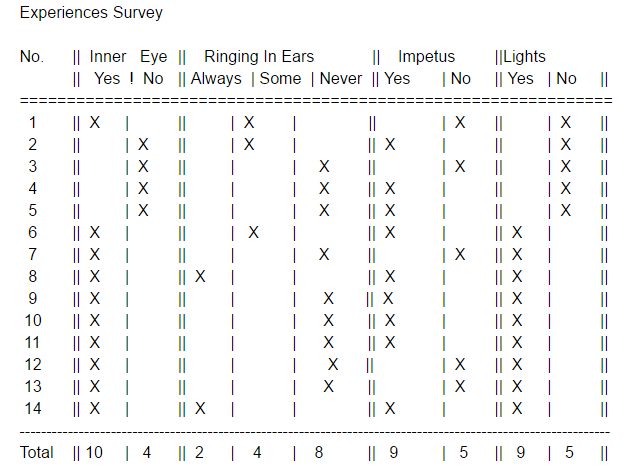Mirror Neurons and Aphantasia — A Survey
I recently took a survey, part of my interest in mirror neurons. The object was to see if there is a correlation between the experience of motor-perception of mirror neurons, and the experience of the “inner eye” or phantasia. There are four questions:
Some people have what could be called an “inner eye.” When they think of something, they have an image of it in their mind, almost as if in a movie. Some other people do not experience this inner image when they think of a thing. Please circle A or B:
A: I do experience the mental image, or “inner eye.”
B: I do NOT experience an inner image.
Some people hear a high-pitched “ringing in the ears” when they listen intently while in a quiet room. Some people do not hear a ringing sound. Some people hear it all the time, and are bothered by it. Please circle A, B or C:
A. I hear a ringing in my ears all the time, and I hate it.
B. I hear a ringing if I listen intently, but I don’t hear it all the time.
C. I never hear a ringing in my ears, no matter how intently I listen.
When watching a sports event or other performance involving broad action, some people feel an impetus to move their muscles, but without actually moving them. For instance, watching a soccer match, when the striker kicks the ball, you may feel something like wanting to kick with your leg. Or, seeing a pianist playing, you may feel an impetus to move your fingers. Some people do not experience this “shadow effort.” Please answer A or B:
A. I do sometimes experience this impetus to move.
B. I never experience that kind of feeling.
When sitting quietly in a darkened room, some people can see shapes of light, amorphous clouds, or shadowy figures. Some people see nothing, only blackness. Please answer A or B:
A. I can see shapes and “lights” when my eyes are closed in a dark room.
B. I see nothing when I close my eyes in a dark room.
The survey was given to a small group of college-educated people, some of whom hold advanced degrees.
Below are the results of the survey:
Observations
Surprisingly, the correlation between Inner Eye and Lights is tremendous. Both involve visual awareness. The correlation between Inner Eye, Impetus and Lights is strong — 9/15 — just not the same individuals. I suspect many of some of the differences are due to differences in consciousness of stimuli.
Conclusions
The sample is too small to draw any definite conclusions, but it would be worthwhile to do this survey with a larger sample.
